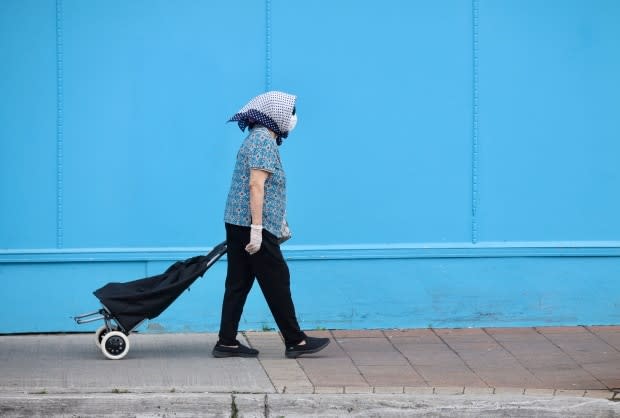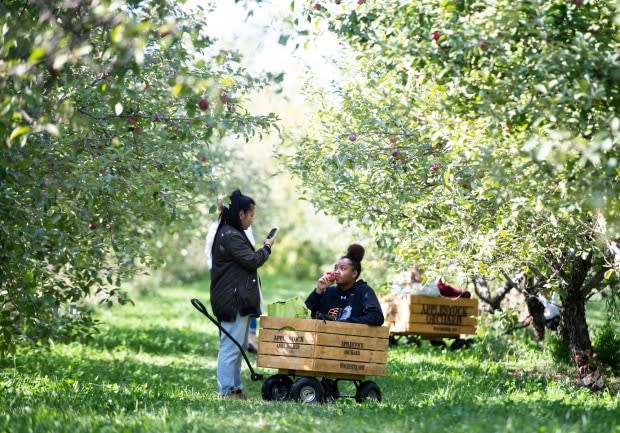What you need to know about COVID-19 in Ottawa on Sunday, Sept. 20

Recent developments:
What's the latest?
An Ottawa elementary school has become the first in Ontario to close due to COVID-19 concerns after two staff members and two students tested positive.
Monsignor Paul Baxter Catholic School in Barrhaven will now be closed for about 14 days. Parents and guardians with children there were notified of the closure yesterday.
Fellowes High School in Pembroke, Ont., was the province's first secondary school to shut down when it closed last week — and this weekend, the local health unit confirmed a community case of COVID-19 connected to that outbreak.
That person is currently self-isolating, according to the Renfrew County and District Health Unit.
Ottawa Public Health (OPH) is only reporting 15 new cases of COVID-19 today, the lowest one-day total since Sept. 10 and far fewer than the 63 cases announced Friday.
As people report waits of more than three hours for a COVID-19 test, two more pop-up test centres have opened near the Ottawa Senators' home arena.
It's not clear how long the drive-thru sites will remain at the Canadian Tire Centre, but today they'll be open from 9 a.m. until 6 p.m. No appointments are required.
How many cases are there?
Testing has confirmed 3,619 cases of COVID-19 in Ottawa since the start of the pandemic.
As of Sunday, 485 of those were active cases, while 2,860 are considered resolved. There have been 274 deaths.
Overall, public health officials have reported more than 5,500 cases of COVID-19 across eastern Ontario and western Quebec, with more than 4,400 of those cases considered resolved.
COVID-19 has killed 104 people in the region outside Ottawa: 52 people have died in Leeds, Grenville and Lanark counties, 34 in the Outaouais and 18 in other parts of eastern Ontario.
What's open and closed?
Private unmonitored gatherings across Ontario are now limited to 10 people indoors and 25 people outdoors until at least mid-October, Premier Doug Ford announced at a news conference at Queen's Park Saturday.
Three COVID-19 hot spots — Ottawa, Toronto and Peel Region — were put under the same restrictions earlier this week.
Ottawa will resume ticketing drivers who park longer than allowed in unmarked areas on Oct. 1, with warnings starting Monday.
Kingston, Ont., meanwhile, has tightened its distancing rules in city parks and increased fines.
Quebec has similar rules to most of Ontario, with its cap on physically distanced gatherings in public venues now up to 250 people, allowing smaller festivals.
That province has warned some regions could see their gathering size maximums reduced and lose dine-in service at restaurants.

Every local school board or service centre has now brought students back.
More than 2,000 students in Ottawa's English school boards, however, don't have their usual school bus because of a shortage of bus drivers.
Distancing and isolating
The novel coronavirus primarily spreads through droplets when an infected person coughs, sneezes, breathes or speaks onto someone or something.
People don't need to have symptoms to be contagious.
That means physical distancing measures such as working from home, meeting others outdoors as much as possible and keeping distance from anyone you don't live with or have in your social circle, including when you have a mask on.
WATCH: Rapid rise in cases triggering second wave:
Ottawa's medical officer of health is pleading with residents to reduce the number of people they're in close contact with as new cases of COVID-19 continue to surge.
Masks are now mandatory in indoor public settings in all of eastern Ontario and Quebec, including transit services and taxis in some areas.
Quebec has given police the power to fine people ignoring mandatory mask laws.
Masks are also recommended outdoors when you can't stay the proper distance from others.
Anyone who has travelled recently outside Canada must go straight home and stay there for 14 days.
In Ontario, that's the same period of self-isolation for anyone with symptoms. When self-isolating, only leave home or see other people if it's critically important, such as to go see a doctor.
Most people with a confirmed COVID-19 case in Quebec can end their self-isolation after 10 days if they have not had a fever for at least 48 hours and has had no other symptom for at least 24 hours.
Health Canada recommends older adults and people with underlying medical conditions and/or weakened immune systems stay home as much as possible.

What are the symptoms of COVID-19?
COVID-19 can range from a cold-like illness to a severe lung infection, with common symptoms including fever, a cough, vomiting and the loss of taste or smell.
Less common symptoms include chills, headaches and pinkeye. Children can develop a rash.
Getting tested any sooner than five days after potential exposure may not be as useful since it takes about that long for the virus to grow to be detectable by a test, said Ottawa's medical officer of health Vera Etches in early September.
If you have severe symptoms, call 911.
Where to get tested
In eastern Ontario:
In Ottawa any resident can get tested, but record wait times have led Ottawa Public Health (OPH) to ask that testing be limited for now to people with symptoms or who have been referred for a test because of contact tracing.
Testing for the general public happens at one of four permanent sites, with additional mobile sites designed to help wherever demand is particularly high.
Inuit in Ottawa can call the Akausivik Inuit Family Health Team at 613-740-0999 for service, including testing, in Inuktitut or English on weekdays.
Two pop-up test sites launched this weekend at the Canadian Tire Centre, although it's not clear how long they'll be there. There is also a pop-up clinic at the Wabano Centre in Vanier Monday and Tuesday.
The University of Ottawa has a test site open weekdays by appointment at its Lees campus for students and staff.
There's also a mobile testing van operated by Inner City Health that mostly serves people experiencing homelessness and some tests done in hospitals.
In the Eastern Ontario Health Unit, there is a drive-thru centre in Casselman and walk-up site in Hawkesbury and Winchester that don't require people to call ahead.
Others in Alexandria, Rockland, Cornwall and now Winchester require an appointment.

In Kingston, the Leon's Centre is hosting the city's test site though Gate 2. There's another test site at Queen's University's Mitchell Hall open 5 to 8 p.m. on weekdays.
Napanee's test centre is open daily for people who call ahead.
You can arrange a test in Bancroft, Belleville or Trenton by calling the centre and in Picton by texting or calling. Only Belleville and Trenton run seven days a week.
The Leeds, Grenville and Lanark unit asks you to get tested if you have a symptom or concerns about exposure.
It has a walk-in site in Brockville at the Memorial Centre and testing sites in Smiths Falls and Almonte which require an appointment.
Renfrew County residents should call their family doctor and those without access to a family doctor can call 1-844-727-6404 to register for a test or if they have health questions, COVID-19-related or not.
People can also visit the health unit's website to find out where testing clinics will be taking place each week.
WATCH | Prominent COVID-19 benefit ending soon:
In western Quebec:
Outaouais residents can get a walk-in test in Gatineau seven days a week at 135 blvd. Saint-Raymond.
There are recurring clinics by appointment in communities such as Gracefield, Val-des-Monts and Fort-Coulonge.
They can call 1-877-644-4545 to make an appointment or if they have other questions.
First Nations:
Akwesasne has had 14 confirmed COVID-19 cases, most linked to a gathering on an island in July.
It has a mobile COVID-19 test site available by appointment only. Anyone returning to the community on the Canadian side of the international border who's been farther than 160 kilometres away — or visited Montreal — for non-essential reasons is asked to self-isolate for 14 days.
In early September, it expanded its gathering limit to 50 people, then ended its curfew. Its schools start bringing students back next week.
Anyone in Tyendinaga who's interested in a test can call 613-967-3603 to talk to a nurse.
People in Pikwakanagan can book an appointment for a COVID-19 test by calling 613-625-2259.
For more information

